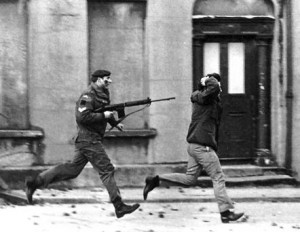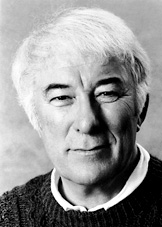Chase Chiamulera, Brian Dolan, and Katie Snider
Introduction
The overall purpose of this project is to highlight the ways in which the structure and strategy of policing in Northern Ireland created a climate of fear and discrimination for the working class Catholic residents of the country. This project makes use of a range of documents to establish a historical context of Northern Ireland’s policing problem in the late 1960’s and early 1970’s. Ultimately, the flashpoint of the policing issue in Northern Ireland was the tragic Bloody Sunday massacre on January 30, 1972.
Image: A youth is arrested at gunpoint on Bloody Sunday
Through the use of documents such as Northern Ireland: The Plain Truth (1969), Seamus Heaney’s The Ministry of Fear and A Constable Calls, and written accounts from Eyewitness Bloody Sunday, this project aims to delineate clearly the degree to which policing strategies negatively affected the working class, Catholic population of Northern Ireland.
Image: Seamus Heaney, Irish Poet
Northern Ireland: The Plain Truth (1969) provides convincing eyewitness accounts of police brutality as well as startling statistics regarding the disproportionate representation of Protestants among Northern Ireland’s police forces. In this way, Northern Ireland: The Plain Truth provides a good starting point for understanding the extent of Northern Ireland’s policing problem. Heaney’s The Ministry of Fear and A Constable Calls provide a first-hand account of what life was like under the ever-present authority of Protestant police. The sentiments conveyed by Heaney in these two poems are reflective of the environment detailed throughout Northern Ireland: The Plain Truth.
Building on this contextual background, this project will describe in detail the tragic events that took place on Bloody Sunday, January 30, 1972. Bloody Sunday was not just an isolated and unfortunate incident of police brutality, rather, it was the culmination of a period of increasing belligerence on the part of Protestant police forces and was the direct result of systemic disproportionate representation and discrimination, as highlighted in Northern Ireland: The Plain Truth and throughout Heaney’s The Ministry of Fear and A Constable Calls.
Finally, this project will attempt to draw historical connections between the policing situation in Northern Ireland and more modern instances of police brutality and discrimination. Specifically, this project aims to establish connections between the situation in Northern Ireland in the late 1960’s and early 1970’s and the situation surrounding the Los Angeles riots in 1992 as well as the conditions in Ferguson, Missouri in 2014.
ROADMAP


